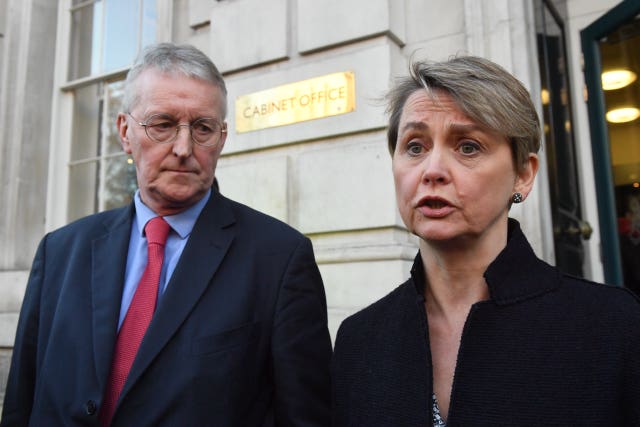May faces fresh Commons fights over Brexit
Labour calls for option of second referendum to be considered by MPs next week.

Fresh Commons clashes over launching a second Brexit referendum and blocking a no-deal EU withdrawal loom as Theresa May faces new challenges to her authority.
Labour wants Parliament to be given the option to back a national poll on Brexit when MPs vote on the Government’s EU exit stance next week.
An amendment to the Prime Minister’s Brexit motion calls for a vote on backing Labour’s plan for a customs union with the EU, and whether to legislate “to hold a public vote on a deal or a proposition” supported by a Commons majority.
The move came as it was understood that Work and Pensions Secretary Amber Rudd had urged Downing Street to allow Tory MPs a free vote on moves aimed at preventing a no deal, amid fears that dozens of ministers could otherwise resign.
Meanwhile, the Daily Telegraph reported that Tory HQ has been effectively put on a snap general election “war footing” due to the Brexit situation in Parliament.
Despite Mrs May’s claim that a second referendum could “damage social cohesion”, Labour leader Jeremy Corbyn said the option should be considered.
He said: “Our amendment will allow MPs to vote on options to end this Brexit deadlock and prevent the chaos of a no deal.
“It is time for Labour’s alternative plan to take centre stage, while keeping all options on the table, including the option of a public vote.”
However, Labour’s amendment was carefully worded and did not explicitly say the party would officially support a second referendum.
In a break from usual parliamentary rules, MPs will be able to amend the so-called “neutral motion” tabled by the Prime Minister on Brexit, with votes due to take place on amendments chosen by Speaker John Bercow on January 29.

A cross-party group of MPs, including Labour’s Yvette Cooper and Tory former minister Nick Boles, is seeking to give time for a Bill to suspend the Article 50 withdrawal process if there is no new deal with Brussels by the end of February.
Labour’s Hilary Benn has tabled an amendment to the Government motion calling for a range of indicative votes on various Brexit options.
He tweeted: “Just tabled an amendment for next week’s Brexit debate calling for the House of Commons to hold a series of indicative votes on a way forward.”
And Tory former attorney general Dominic Grieve is looking to allow a motion by a minority of 300 MPs – from at least five parties and including 10 Tories – to be debated in order to allow for indicative votes on where to go next.
In a sign of Labour divisions on the issue of a second Brexit referendum, shadow housing minister Melanie Onn said she could not support such a move.
The Great Grimsby MP tweeted: “This may mean that I am required to step down from my front bench housing role if it is a whipped vote.”
However, Chuka Umunna, a prominent supporter of a People’s Vote, called for a firmer stance.

He tweeted: “There is always a flurry of excitement when the frontbench acknowledges the obvious – that a People’s Vote may be the only way forward (it is) – but that is not the position adopted by those running the show. Supporting “options” is not a credible or sustainable policy.”
Presenting her “Plan B” to the Commons on Monday, Mrs May said she would conduct further talks on the controversial Irish border backstop proposals, and promised to give Parliament “a proper say” in negotiations on the future relationship between the UK and EU.
But the PM refused to rule out a no-deal Brexit, and insisted there was no majority in the House of Commons for a so-called People’s Vote.
Mrs May announced she was scrapping a £65 fee for EU nationals wanting to remain in the UK after Brexit, promised to guarantee workers’ rights and environmental safeguards.
Irish foreign minister Simon Coveney said Brexit negotiator Michel Barnier had assured him the EU remains “firmly supportive” of the Withdrawal Agreement in full, including its guarantees of no hard border in Ireland.





